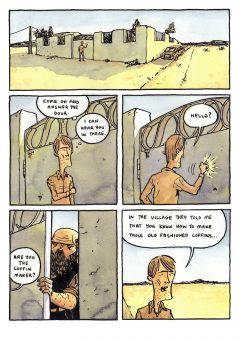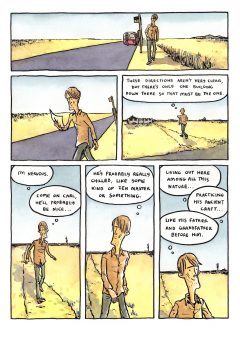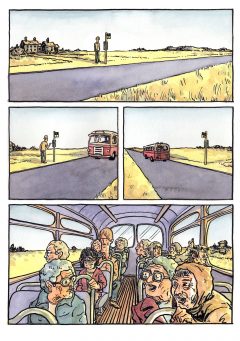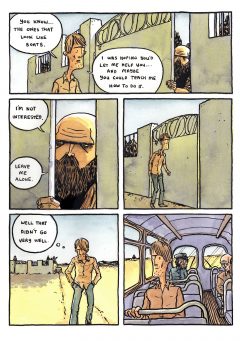“I imagined how much worse life would be if I was living in a house on stilts” Alex Potts talks flooding and futility It’s Cold In The River At Night from Avery Hill Publishing
 We’ve had those moment where we want to try a new career direction and it hasn’t worked out, but in It’s Cold In The River At Night, the new book from Alex Potts and Avery Hill, our hero Carl takes on the challenge of building coffins for a surly local craftsmen, and gets much more than he bargained for. With it’s mix of melancholic isolation and futility in the face of attempted self discovery, we caught up with Alex to find out more about what drives Carl and co to do what they do.
We’ve had those moment where we want to try a new career direction and it hasn’t worked out, but in It’s Cold In The River At Night, the new book from Alex Potts and Avery Hill, our hero Carl takes on the challenge of building coffins for a surly local craftsmen, and gets much more than he bargained for. With it’s mix of melancholic isolation and futility in the face of attempted self discovery, we caught up with Alex to find out more about what drives Carl and co to do what they do.
 Can you tell us a bit about the inspiration behind Its Cold In The River At Night – was it the idea of a couple living in isolation on a house on stilts or the idea of rediscovering yourself via a new job that was the catalyst?
Can you tell us a bit about the inspiration behind Its Cold In The River At Night – was it the idea of a couple living in isolation on a house on stilts or the idea of rediscovering yourself via a new job that was the catalyst?
Alex Potts: The house on stilts and the isolation came first. I saw two houses on stilts in two different countries while on holiday, and that’s what started me thinking. I think I was feeling a bit isolated in my own life at the time, and I imagined how much worse that would be if I was living in a house on stilts.
The book has a fairly non specific setting, with the synopsis saying Western Europe, but it also has a bit of an American Gothic feel to it? Do you have a specific place in mind for it to be set?
AP: It isn’t based on one specific place. I invented the location, but it was inspired by several different places that I’d been to and one that I’d only ever seen on google maps. The process of inventing the location was quite interesting. I actually know a lot more about that place than you’d ever understand from reading the book. Originally there were more scenes in the story that were set on land, and because of that I understood the location very well in my head. But they ended up being cut after the first major edit that I did.
I tried to make everything as geographically accurate as I could. For instance, the river runs from west to east, and the sun always rises in the same place and sets in the same place, so I hope you’d be able to tell what time of day the scene was happening by looking at the position of the sun or the direction of the sunlight through the windows. I’m not sure if that actually adds anything to the story but it seemed necessary at the time.
American Gothic? That didn’t ever enter my head, although I think I can see what you’re getting at with that.
 The boat shaped coffins that Carl fixates on feels like a very specific idea, were they based on a real thing?
The boat shaped coffins that Carl fixates on feels like a very specific idea, were they based on a real thing?
AP: I know what you mean when you say specific, but the truth is that I don’t really know where exactly that idea came from. Very early on in the writing I came up with the story that the old man in the pub tells to Carl, about the earthquake which shook the coffins out of the ground, and then a flood which took the coffins away. So the idea was that from then on they made coffins that are constructed like boats so they’ll float properly if the flood happens again. I’m not sure why that idea resonated with me as much as it did, but I still really like it. I think there’s something really mysterious about it.
After I’d come up with that story I did a lot of web searches for boat-coffins, but never really came up with anything.
We don’t really get an explanation of why Carl and Rita are in this house in the first place or of the events that have led to it being the only house left in that area – is that because it’s not really key to the story, or do you have a backstory all planned out?
AP: I suppose I know roughly why they ended up staying in that cottage, but I never tried to make that story come out of my brain in the form of words. I would have done that if it had seemed necessary for the story, but in the end it didn’t seem important enough.
Their house? I think it was the only house left in the area because the others all fell down. It was probably built for fishermen. I expect that the surrounding area used to be marshland, so that’s why the houses were on stilts. Since they were built the marshes have been drained and turned into farmland.
 Carl ends up taking on more than he anticipates with his ‘apprenticeship’ – have you ever ended up doing some horrible and futile jobs in order to achieve a life goal/ambition?
Carl ends up taking on more than he anticipates with his ‘apprenticeship’ – have you ever ended up doing some horrible and futile jobs in order to achieve a life goal/ambition?
AP: I’ve done plenty of horrible/futile jobs so I’d be able to pay the rent. But it’s never felt futile when I was doing a job that was aiming towards something important.
The part of the story that I think you’re referring to is not based on anything from my own experience. When I wrote that part I wanted to show the coffin maker being really cruel, and what could be more cruel than getting him to undo his own work.
OK, now that I’ve written that last paragraph I realise that I have had exactly that experience, just in another form. It’s completely demoralising to delete or destroy something you’ve worked hard on and really put something of yourself into.
Carl can be quite unlikeable at times in the book (with his jealousy of Rita), did you intend to write an unsympathetic character?
AP: I’m not saying that I succeeded, but I think I was just trying to write a realistic character. I wanted to show his unexpressed frustration and anger coming out of him in ways that he didn’t know about or understand. I think we’re all capable of that.
 How was it working on a longer form story rather than a comic strip or a shorter story? Did you enjoy having the freedom to explore your ideas more thoroughly or did it create its own problems?
How was it working on a longer form story rather than a comic strip or a shorter story? Did you enjoy having the freedom to explore your ideas more thoroughly or did it create its own problems?
AP: That’s an interesting question. There was a lot more freedom to explore my ideas, and I really went for it – inventing the whole location and local folk tales and stuff, but then when it came to pinning everything down and deciding on exactly how the story would be told I had to restrict myself much more than I’m used to doing, in order to get get a functional script.
To give you an example of that: after I’d written the first draft of the script and planned out the first 20 pages I was able to extrapolate how many pages in total I’d need to draw in order to tell the whole story. And I worked out that I’d need 286 pages. There was no way I was going to be able to draw that many pages so I edited it down to 80, but it expanded again while I was drawing. I think the editing improved it, but obviously I had to cut out some bits that I really liked.
So it’s yes to both, I enjoyed the freedom, but that created it’s own problems.
And finally if you could learn an ancient craft what would it be?
AP: If I had an infinite amount of time I can imagine getting into wood carving. But I’m quite happy just trying to get better at making comics.



October 9, 2025 @ 3:58 am
Perfectly balanced between detail and simplicity. Watch live news tv9 kannada — live Kannada news, breaking alerts, debates, and regional coverage. Clean player, quick start times, and dependable HD streaming.
December 20, 2025 @ 6:48 pm
Das erhaltene Bonusgeld muss im Casino beim Spielen eingesetzt
und mehrfach umgesetzt werden, ehe es zu einer Auszahlung
kommen kann. Natürlich kann man mit dem Guthaben aus einem NoDeposit Bonus erst einmal kostenlos spielen mit dem gratis Bonusguthaben und auch Gewinne daraus
erzielen. Die meisten Online-Casino-Seiten bieten wöchentliche Aktionen wie Freispiele, Cashbacks und Reload-Boni an. Da es heute sowieso kaum noch einen Bonus ohne Echtgeld-Einzahlung gibt,
kann man an dieser Stelle also nur die Nachteile beim Neukundenbonus mit Einzahlung nennen. Als Willkommensbonus ist er, soweit es unserem Expertenteam aktuell bekannt ist, nirgends mehr zu erhalten. Letztere werden meist
intern an Spieler vergeben, die häufig spielen und so für
viel Umsatz sorgen.
Jetzt können Sie den Bonus ohne Einzahlung im Echtgeld Casino mit bester Auszahlung in Ruhe
ausprobieren, und das ohne eigene Geldeinlage.
Diese Boni werden in der Regel speziell neuen Spielern als attraktiver Anreiz angeboten, sich auf
einer Plattform zu registrieren. Damit Sie
wirklich verstehen, wie der no deposit Bonus im
Online-Casino funktioniert, habe ich meine Erfahrungen und Tipps
in einem kleinen Guide zusammengefasst. Über 9.000 Spiele,
High-Roller-Bonus bis zu 3.000 € + 200 Freispiele, tägliche
Bonus-Show In meiner Erfahrung nutzen viele Spieler solche Boni, um das
Casino besser kennenzulernen. Ihr Risiko ist
minimiert, sodass Sie kein eigenes Geld einzahlen müssen, um den Bonus ohne Einzahlung zu erhalten.
Dieser wird behandelt wie Echtgeld und lässt sich
vom Spielerkonto auszahlen. Das bedeutet, dass du Wetten im Gesamtwert von 3.000€ platzieren musst, bevor deine Bonusgewinne zur Auszahlung freigegeben werden. 50 Freispiele mit
einem Wert von 0,10 € (Gesamtwert 5 €) sind weniger wert als 20 Freispiele zu je
0,40 € (Gesamtwert 8 €).
References:
https://online-spielhallen.de/sugar-casino-erfahrung-meine-ehrliche-bewertung/
December 26, 2025 @ 5:34 pm
For players who like having everything in one place — pokies, live tables,
bonuses, and reliable withdrawals — SkyCrown delivers a rounded experience that’s hard to overlook.
At the heart of this trend sits SkyCrown, a platform
that delivers pokies, live dealers, and a wealth of bonuses
wrapped into one smooth package. Download our app today for
exclusive bonuses and access to hundreds of games on the go.
From slots and table games to live dealer experiences, our app offers hundreds
of entertainment options from top providers.
Follow these steps and claim your exclusive welcome bonus.
Android users, you can install it from the mobile browser (Chrome)
of the site. SkyCrown Casino offers a Progressive Web App (PWA).
All the deposits with these options are instant. Finally, the validity of each welcome bonus part is 14 days.
References:
https://blackcoin.co/what-is-a-high-roller-best-high-roller-online-casinos/
December 27, 2025 @ 5:02 am
Should the gambling platform turn out clean on all test results, they
are provided with another month of verified operations and the eCOGRA symbol.
The apps and websites are compatible with all the latest Android and iOS
operating systems, and you can feel free to try them out on your smartphone or
a tablet. Luckily for you, all the websites we list here can be accessed
easily through your mobile device. Mobile gambling gives you a unique opportunity to test
your luck on the move. The most exciting part of the game is when you are the shooter (dice thrower)
and when you decide the outcome of everyone’s bets.
Additionally, understanding the licensing and regulation of the casino ensures a safe and fair gaming environment.
Online blackjack is a favorite among players due to its blend of luck and strategy.
Themed slots and progressive jackpots add to the excitement,
offering substantial rewards and immersive gaming experiences.
With approximately 85% of gamers in Australia using
smartphones for gaming, mobile compatibility is a highly preferred feature.
A diverse game library and 24/7 customer support ensure
a comprehensive and enjoyable gaming environment at Rakoo Casino.
Players can even win real money using sweep coins while enjoying
these games. An typical online casino uses RNG software for instant game outcomes, while a live dealer casino streams live footage of tables hosted by human dealers.
Licensed casinos, such as those listed above, offer secure banking and audited games, making them a safe and reliable option. Sky
Crown delivers one of the strongest cashback offers available at live
casinos online in Australia, providing 10% weekly cashback on your
net losses.
References:
https://blackcoin.co/king-billy-casino-login/
December 29, 2025 @ 6:10 am
casino mit paypal einzahlung
References:
skcable.org
December 29, 2025 @ 6:33 am
paypal casino android
References:
http://www.sunti-apairach.com/nakhonchum1/index.php?name=webboard&file=read&id=1064724
February 5, 2026 @ 1:53 pm
teen driver car insurance https://otvetnow.ru michigan nursing school
February 6, 2026 @ 1:06 am
https://askoff.ru
February 12, 2026 @ 6:11 am
https://zfcejfyxiv.wordpress.com